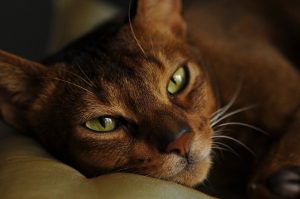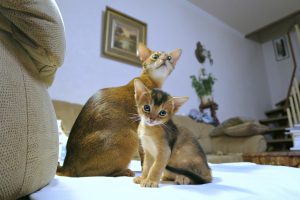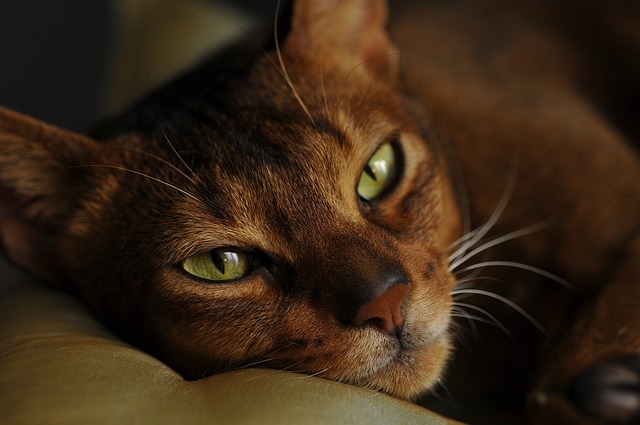Abyssinian cat
 |
| Abyssinian Cat |
Many people do not know that the Abyssinian cat is a wild cat crossbreed. Yet it is immediately noticeable, especially because of its beautiful colour and slender build. The intelligent, curious cats are generally very calm. Nevertheless, they always have a watchful eye. They love people and feel very comfortable in the family. The Abyssinian cat is a beautiful speciality, which used to be very popular, but is less common today. It is a welcome participant at exhibitions and cat shows. Learn all about this unique breed here and what housing conditions you need to create if you want to take in such a wonderful kitten.
The look of Abyssinian cats
Every cat breed has its own look that sets it apart from others. This breed is a medium-sized breed that has a strong, lithe body. The long and slender legs, make the cat look less sturdy. It therefore looks more elegant and filigree. The head of the Abyssinian cat is characterized by its rounded, clover-shaped appearance. At the tips of the ears, these magnificent animals carry their typical tufts. Their eyes are large and almond-shaped. Abyssinian cats have a close-fitting, short coat, which has a characteristic colour. This colour is caused by the fact that each hair of their coat is coloured with multiple bands. This coat nuance is also called ticking. Abyssinian cats with wild coloured coats are particularly well known. However, other coat colours also exist today.
Where does the Abyssinian breed come from?
On closer inspection, the breed looks like an African wild cat, which is the ancestor of the domestic cat. However, the history of the Abyssinian is not really known. It is assumed that they were taken home from Abyssinia around 1860 by members of the British military. Abyssinia is today’s Ethiopia. These cats were then crossed with British Shorthair cats. Later, oriental breeds were crossed with them. Since 1970 there are also long-haired Abyssinian kittens. These have been bred as a separate breed since the 1970s. They are then called Somali. Unfortunately, Abyssinians often suffer from pyruvate kinase deficiency. This is a hereditary disease that can cause anaemia. Today, however, there is a reliable test that clearly shows whether this disease is present or not. Reputable breeders always have their kittens tested before giving them to their new owners. There is also a risk that Abyssinian cats suffer from the eye disease of progressive retinal atrophy. This leads to blindness in the course of the cat’s life.
How should an Abyssinian be kept?
This cat breed has adapted well to life with humans. The pedigree cats are considered to be very intelligent and alert, yet they have a cuddly nature. They have a close relationship with their owners and their family. They are also said to feel very attached to their people. Everybody like to have a lot of space and are generally active cats. In addition, they are excellent climbers, love trees and also enjoy exploring the garden. Abyssinians like to be outdoors and enjoy trying out the various climbing opportunities that are available to them outdoors. Basically, these cats are playful, but they have enough sense not to go beyond their limits, or even become daring. These cats can therefore be kept both as outdoor cats and as indoor cats. In the latter case, however, sufficient space must be available. Furthermore, sufficient climbing possibilities should be available as an offer.
This has to be considered when feeding and caring for Abyssinian cats
As every cat is different, the feeding is always quite individual. Some cats do not like dry food, others only like a certain kind of food. It is important that the diet is always adapted to the age of the cat, the housing conditions, and the health of the animal. The Abyssinian cat is quite easy to care for. Their coat can also be combed or brushed easily. Most animals of this breed are even said to like this very much and enjoy the grooming. The coat has a beautiful sheen and can be made to shine with a moistened chamois leather. Vaccinations, worming, and other treatments, which are a regular part of the process, must also be carried out on this breed. Annual health checks are also recommended for cats that do not travel to shows. All in all, this is a quite robust cat breed, which is affectionate with its people, and if it has enough exercise and exercise, offers an absolutely uncomplicated nature.
 |
| Abyssinian cat kittens |

